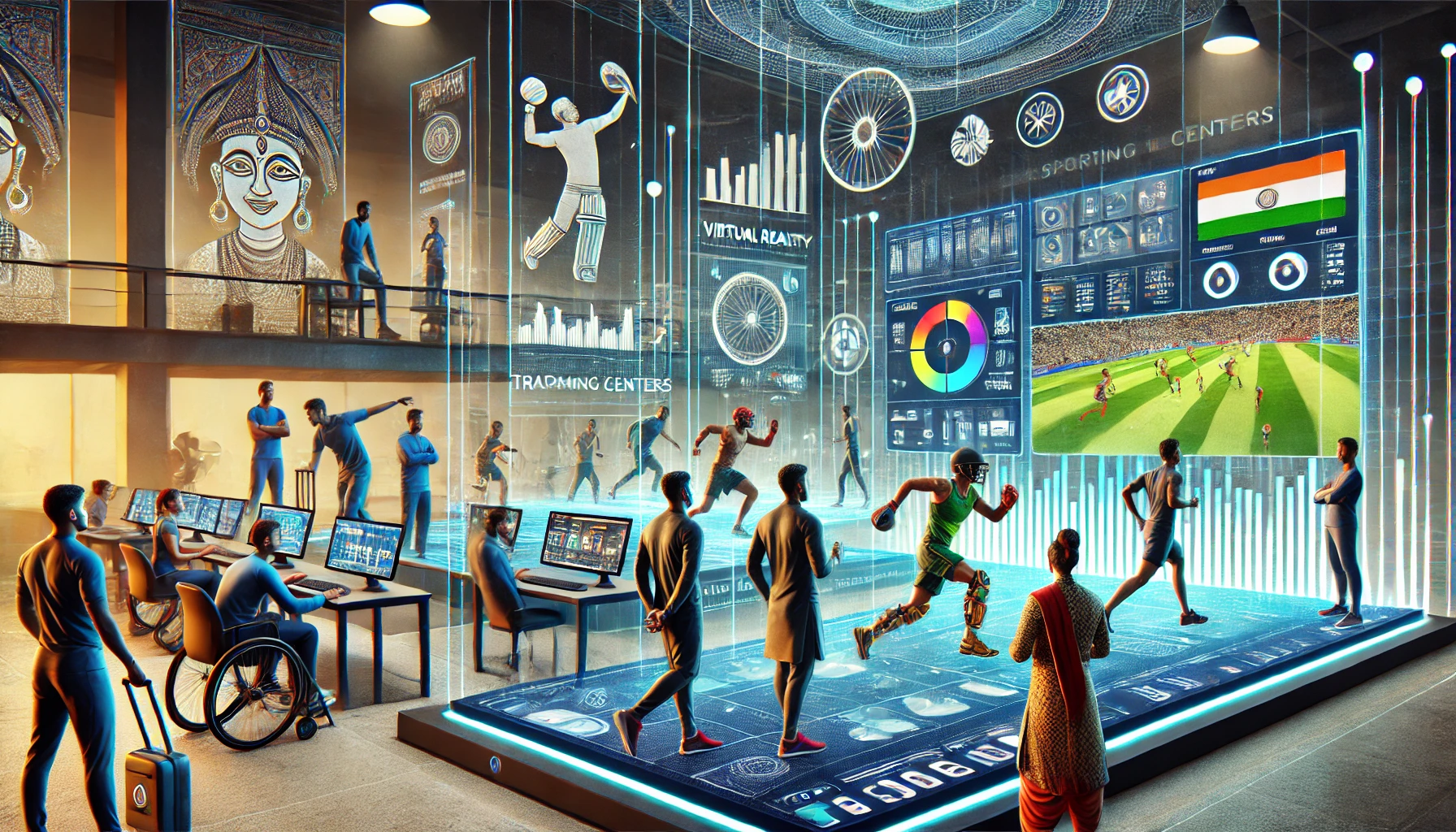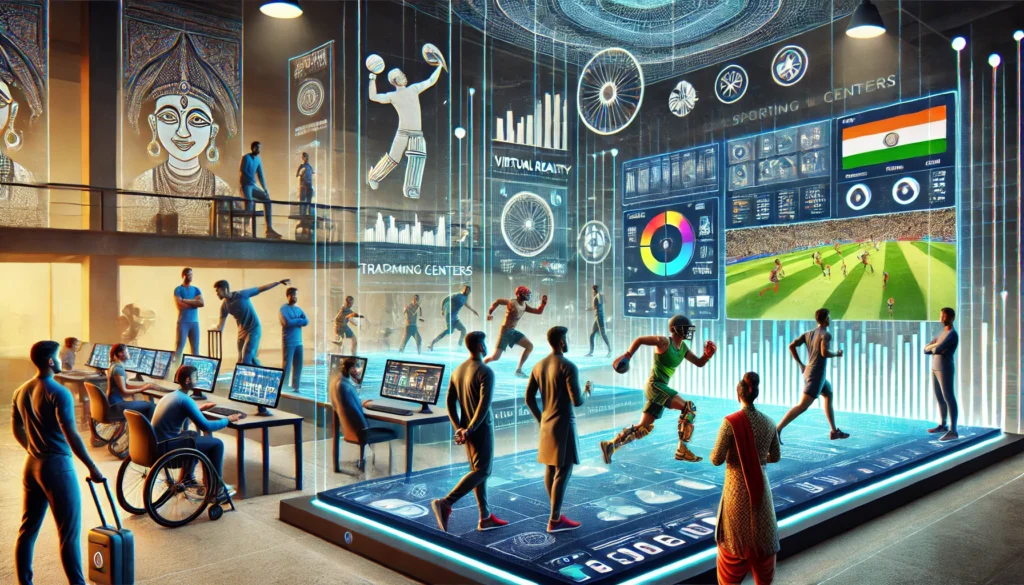The Intersection of Sports and Technology in Indian Training Centers
In recent years, the fusion of sports and technology has revolutionized the way athletes train and perform in India. From grassroots initiatives to elite national training centers, technology is becoming a core component of athlete development, helping them optimize their physical and mental performance. The integration of cutting-edge advancements like data analytics, wearable devices, and AI-driven insights is reshaping the landscape of Indian sports training. These innovations are not just about enhancing athletic performance, but also about reducing injury risks, improving recovery times, and providing personalized feedback that was once impossible to achieve. Indian training centers are increasingly leveraging these tools to create more scientific and data-driven approaches to training, which is crucial for preparing athletes for international competitions. With an eye on Olympic success and a growing interest in sports across the nation, India’s training centers are quickly adopting the latest technological innovations to remain competitive on the global stage. The future of sports training in India lies at the intersection of tradition and technology, where advanced tools complement the hard work and discipline of athletes.
Technological Advancements Transforming Athlete Training
Technological advancements have dramatically altered the way athletes train, recover, and perform. In Indian training centers, the adoption of new technologies has played a key role in elevating the standards of athletic preparation. These tools not only provide real-time data about an athlete’s physical condition but also enable coaches to make informed decisions that can lead to significant improvements in performance.
Data Analytics and Performance Tracking
One of the most significant technological innovations in Indian training centers is the use of data analytics for performance tracking. By collecting detailed metrics on an athlete’s movements, speed, endurance, and strength, coaches can now monitor progress more accurately than ever before. This data-driven approach allows for the identification of both strengths and weaknesses, enabling targeted improvements in specific areas. With the help of advanced analytics software, training programs are now more personalized, and athletes receive feedback that helps them adjust their technique in real time.
Wearable Technology and Biometric Monitoring
Wearable technology, such as smartwatches, heart rate monitors, and GPS trackers, is becoming commonplace in Indian training facilities. These devices offer real-time biometric monitoring, providing athletes and coaches with immediate feedback on key metrics such as heart rate, oxygen levels, and recovery times. Wearables help track an athlete’s workload and ensure that they are training within optimal thresholds, preventing overtraining and minimizing the risk of injury. Moreover, biometric data helps tailor recovery protocols, ensuring that athletes maintain peak performance throughout the competitive season.
Virtual Reality for Enhanced Skill Development
Another breakthrough technology gaining popularity in Indian training centers is virtual reality (VR). VR is being used as a tool to enhance skill development, particularly in sports like cricket, hockey, and football, where tactical awareness and decision-making are critical. VR simulations allow athletes to immerse themselves in real-world scenarios and practice specific game situations without the physical wear and tear of traditional training. This not only helps improve cognitive responses but also builds mental toughness by simulating high-pressure situations in a controlled environment.
The combination of data analytics, wearable technology, and virtual reality is transforming the way Indian athletes train. These advancements are not just helping athletes reach new heights in performance but also ensuring they stay healthy and well-prepared for the demands of their respective sports.
Integration of Artificial Intelligence in Training Programs
Artificial intelligence (AI) is increasingly being integrated into sports training programs in India, providing athletes and coaches with powerful tools to enhance performance and minimize risks. AI technology is being used to analyze vast amounts of data, predict injury risks, and create customized training plans, making it an essential part of modern sports training in the country.
- Personalized Training Plans
AI-driven software can analyze an athlete’s performance data to create highly personalized training programs. These programs are tailored to the individual needs of each athlete, taking into account their current fitness level, recovery rate, and areas that need improvement. This approach ensures that athletes train more efficiently, focusing on their weaknesses while maintaining their strengths. By continuously analyzing new data, AI systems can adjust training routines in real time, ensuring that the athlete is always working at their optimal level. - Injury Prevention and Recovery
One of the major benefits of integrating AI into sports training is its ability to predict and prevent injuries. AI systems analyze data from wearable devices and biometric sensors to identify patterns that could lead to overuse injuries or other health issues. By detecting early warning signs, coaches can modify training loads or implement specific recovery strategies, reducing the likelihood of injuries. In addition, AI is also used to track recovery progress, ensuring that athletes return to training and competition at the right time. - AI-Powered Performance Analysis
AI-powered video analysis tools are being used in Indian training centers to break down an athlete’s performance in granular detail. These tools can analyze every movement, from the angle of a cricket bowler’s arm to the foot positioning of a sprinter. By providing detailed feedback on technique and form, AI helps athletes refine their skills and make precise adjustments. This real-time feedback can lead to immediate improvements in performance, making it a valuable asset for athletes and coaches alike.
The integration of AI into sports training in India is providing a new level of sophistication in how athletes prepare for competition. By combining AI with traditional coaching methods, Indian training centers are helping athletes maximize their potential while reducing the risks associated with high-performance sports.
Top 5 Training Centers in India Utilizing Advanced Technology
India’s sports training infrastructure has seen a significant transformation, with many centers embracing advanced technologies to enhance athlete development. Here are five training centers that stand out for their integration of cutting-edge tools in their programs:
- Sports Authority of India (SAI)
The Sports Authority of India (SAI) is a government institution that plays a pivotal role in nurturing India’s top athletes. SAI centers across the country are equipped with high-tech facilities, including advanced sports science labs, biometric monitoring systems, and video analysis tools. These technologies help in the assessment and improvement of athlete performance across a wide range of sports. - Inspire Institute of Sport
Located in Karnataka, the Inspire Institute of Sport is a state-of-the-art facility that focuses on high-performance training for elite athletes. The institute uses a range of modern technologies, such as motion capture systems, AI-based performance analysis, and recovery tools like cryotherapy. Its aim is to provide Indian athletes with the same level of support and technology that international athletes receive. - Padukone-Dravid Centre for Sports Excellence
The Padukone-Dravid Centre for Sports Excellence in Bangalore is one of the leading multi-sport training centers in India. It offers world-class facilities for sports like badminton, squash, and football. The center uses data analytics, wearable tech, and sports science to optimize training programs, ensuring that athletes are equipped with the latest tools to achieve peak performance. - Indian Squash Academy
The Indian Squash Academy in Chennai is known for producing top-tier squash players. It integrates technology into every aspect of its training, from fitness tracking to video analysis. The academy uses real-time data to monitor player performance and adjust training sessions accordingly, making it a leading center for squash training in India. - Lakshya Institute
The Lakshya Institute is focused on providing Indian athletes with advanced training techniques and technology. It uses data-driven methods and AI analysis to enhance the preparation of athletes across disciplines like boxing, wrestling, and shooting. Lakshya’s commitment to innovation has made it a hub for elite athletes looking to take their performance to the next level.
These training centers are at the forefront of India’s efforts to integrate technology into sports, ensuring that athletes are given the tools they need to succeed at the highest level.
The Role of Big Data in Enhancing Sports Strategy and Tactics
Big data has become a game-changer in the world of sports, offering teams and athletes unprecedented insights into performance, strategy, and tactics. In Indian training centers, the use of big data is helping coaches and athletes make more informed decisions, ultimately leading to improved performance on the field.
Real-Time Game Analysis
Big data allows coaches to analyze real-time performance metrics during games and training sessions. With wearable technology and sensors tracking every movement, teams can gather data on player positioning, speed, endurance, and fatigue levels. This information is then used to make real-time adjustments, whether it’s substituting a fatigued player or changing tactical formations. In cricket, for example, big data is used to analyze batting and bowling techniques, helping players refine their strategies based on detailed performance metrics.
Strategic Decision-Making Using Data
Big data is also transforming how teams approach strategic planning. By analyzing data from past matches and training sessions, coaches can identify patterns and trends that may not be visible to the naked eye. This information is then used to develop game plans and tactics that exploit an opponent’s weaknesses while maximizing a team’s strengths. In sports like football and kabaddi, data analytics helps in planning defensive and offensive strategies, ensuring that teams are always prepared for the challenges ahead.
The use of big data in sports is providing a competitive edge to Indian athletes and teams, allowing them to develop more sophisticated strategies and make real-time adjustments that can change the outcome of a game.
Challenges and Opportunities for Expanding Tech-Driven Training in India
As India continues to embrace technology in its sports training centers, several challenges and opportunities lie ahead. While technology offers numerous benefits, there are still hurdles to overcome in terms of accessibility, cost, and integration across all levels of sport.
One of the main challenges is the cost associated with implementing high-tech tools in training centers. While elite facilities have access to the latest technology, many smaller centers lack the funding to integrate advanced tools like AI and biometric monitoring. This creates a gap in the quality of training between urban and rural areas, limiting opportunities for athletes in less developed regions. Addressing this disparity will require both government support and private investment to ensure that all athletes have access to the same level of training.
Another challenge is ensuring that coaches and athletes are properly trained to use new technologies. The introduction of tools like data analytics and AI requires specialized knowledge, and many training centers need to invest in educating their staff on how to effectively use these technologies. Without proper understanding, the full potential of these tools may not be realized.
However, the opportunities for expanding tech-driven training in India are immense. By continuing to invest in technology and training, India can develop a new generation of athletes who are not only physically prepared but also mentally and strategically equipped to compete at the highest levels. With the right infrastructure and support, technology can help transform India’s sports training ecosystem, making it a global leader in athlete development.


